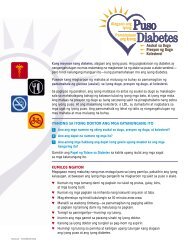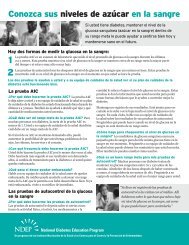Power to Prevent - National Diabetes Education Program - National ...
Power to Prevent - National Diabetes Education Program - National ...
Power to Prevent - National Diabetes Education Program - National ...
Create successful ePaper yourself
Turn your PDF publications into a flip-book with our unique Google optimized e-Paper software.
Appendix Z:<br />
Stress<br />
“ Stress”<br />
is a term many people use <strong>to</strong> express how they feel when they are emotionally<br />
upset, worried, or experiencing health problems such as illness or injury. When<br />
stress occurs, the body prepares <strong>to</strong> take action. This preparation is called the fght-or-fight response.<br />
In the fght-or-fight response, levels of many hormones shoot up. One effect of stress is <strong>to</strong> make a<br />
lot of s<strong>to</strong>red energy—glucose—available <strong>to</strong> cells. These cells are then primed <strong>to</strong> help the body get<br />
away from danger.<br />
In people who have diabetes, the fght-or-fight response can work against them by raising blood<br />
glucose levels.<br />
Many sources of stress are not short-term threats. For example, surgery is defnitely a stress, but it<br />
can take many months <strong>to</strong> recover from it. In this case and others, stress hormones that are designed<br />
<strong>to</strong> deal with short-term danger may stay turned on for a long time.<br />
Many long-term sources of stress are mental. Like physical stress, mental stress can be shortterm—in<br />
situations ranging from taking a test <strong>to</strong> getting stuck in a traffc jam. In many situations,<br />
though—from working for a demanding boss <strong>to</strong> taking care of an aging parent—mental stress can be<br />
long-term. In response <strong>to</strong> the constant mental stress, the body pumps out stress hormones, but this<br />
process is not very helpful in these long-term situations.<br />
How Stress Affects <strong>Diabetes</strong><br />
In people with diabetes, stress can alter blood glucose levels. It does so in two ways. First, people<br />
under stress may not take good care of themselves. They may eat more, drink alcohol excessively or<br />
be less physically active. They may forget, or feel that they do not have time, <strong>to</strong> check their glucose<br />
levels or <strong>to</strong> plan good meals. Second, stress hormones may alter blood glucose levels directly.<br />
Stress and Personality<br />
You have some control over your reaction <strong>to</strong> stress. For some people with diabetes, controlling<br />
stress with relaxation therapy seems <strong>to</strong> help. Try different coping styles for the stressful situations in<br />
your life.<br />
A coping style is how a person deals with stress. For example, some people have a problem-solving<br />
attitude. They say <strong>to</strong> themselves, “What can I do about this problem?” They try <strong>to</strong> change their<br />
situation <strong>to</strong> get rid of the stress.<br />
Other people fnd a way <strong>to</strong> accept a situation they cannot change. They say <strong>to</strong> themselves, “I can<br />
live with this,” or even, “This problem isn’t really so bad after all.”<br />
Can you think of examples of how you have used these coping skills in your life? Can you think of<br />
ways <strong>to</strong> cope with your current stressors?<br />
NDEP <strong>Power</strong> <strong>to</strong> <strong>Prevent</strong> Appendices 93













